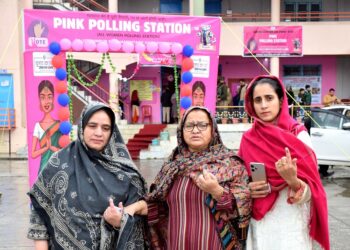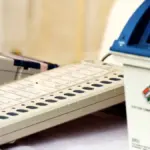Srinagar, May 13: The special polling stations in Srinagar parliamentary constituency witnessed resounding success as a large number of female voters thronged to the polling stations to cast their votes.
The female voters stated they were very happy to cast their votes at these unique polling stations known as Pink Police stations. The ECI (Election Commission of India) has deployed exclusively female staff to promote gender equality and women’s empowerment.
Additionally, for the first time, Red Polling Stations were introduced for people with disabilities, providing them with an environment where they can feel the importance of their votes. Employees with disabilities were deployed to manage these polling stations.
Humaira Nabi, a voter who cast her vote at the Pink Polling Station in Mehjoor Nagar, expressed her happiness at casting her vote at the pink polling station..
The establishment of Red, Young, and Green polling stations sends a powerful message that all votes are equal and everyone’s voice matters. “This is a commendable initiative by the Election Commission of India, and it is hoped that in the remaining parliamentary constituencies, especially women, will cast their votes in favor of their respective candidates,” said one of female voter.
The ECI has set up several facilities at these pink polling stations, including a selfie wall in pink color, which adds a positive vibe.
Shakeela Begum (45), who cast her vote at the Pink Polling Station in Bemina, told Rising Kashmir that providing such great facilities to women voters is good, but the government that will come into power on June 4 should also consider special schemes for women. “Currently, there are several government schemes for women, but it is hoped that more schemes will be introduced after the new government is formed.”
At Habba Kadal, a Red Polling Station was set up for persons with disabilities, where a few disabled persons cast their votes. The polling booth was managed by employees with disabilities.
At every polling station, basic facilities such as water, electricity, toilets, ramps, verandas, and waiting rooms were provided. Wheelchairs and volunteers were provided as and when required.
In order to ensure inclusive voting, polling stations managed by women, specially-abled persons, and youths were set up.
There were 21 green and eco-friendly polling stations. Media facilitation was provided through passes for more than 600 journalists.
Another woman who cast her vote at the pink polling station said she had cast her vote for development and the reduction of electricity tariff bills. “The installation of smart meters has made our lives miserable; we are dependent on daily labor, so how can we pay hefty tariff bills? It is hoped that if my candidate emerges as the winner, he can address this issue in parliament, and we are hopeful that our problem will be eased.”








